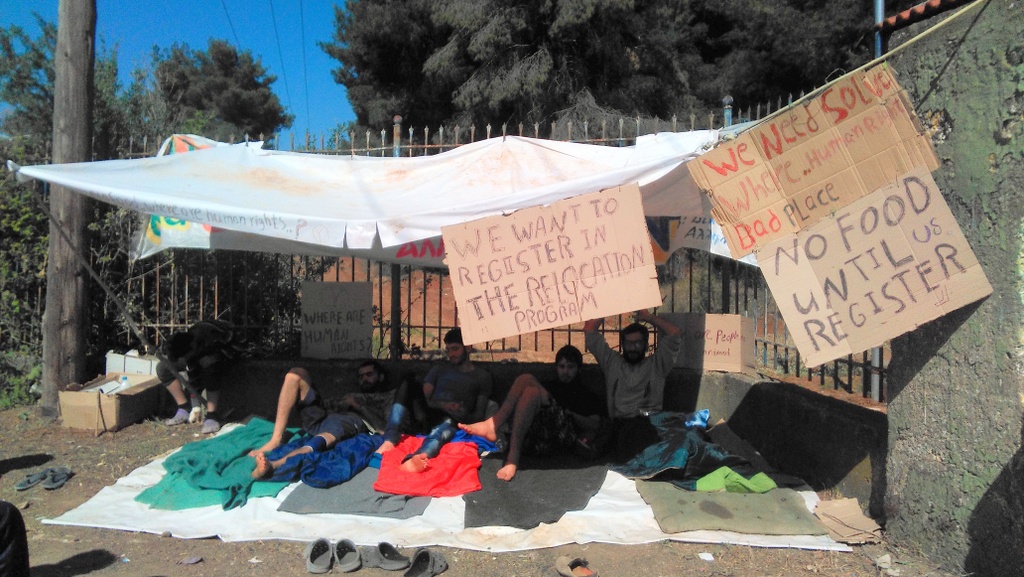
The refugee situation in Greece is overwhelming. Since the borders to the North have closed, tens of thousands of people are stuck here with no legal way to continue their journey. The Greek nation, already at an economic low, is struggling to support them. Food, water, clothing and accommodation are provided in varying amounts and often in haphazard ways. Families are divided. Everyone is unsure of the law and the constantly changing political climate. Chaos reigns.
I’ve felt for many years that internet connectivity is approaching the status of a human right. I volunteered at Bitfixit in Pitsmoor, Sheffield for almost a decade and enabled residents of that disadvantaged area to escape digital exclusion. My heart goes out to refugees (and, yes, other kinds of migrants too) who are separated from family and friends and without access to information. Some have phones and 3G – those who can afford and are willing/able to produce a passport in order to buy them – but many are cut off from a resource which we, privileged, breathe like air.
Yesterday my friend left her phone at work, and an hour of emotional and practical hardship ensued. Imagine being without any connectivity for weeks. Or months. In a foreign country. Unable the speak the language. Alone, or perhaps with your children. No postal address. Perhaps in a refugee camp in a remote area, with no way to get into town except a long, expensive taxi ride or hours of fruitless hitchhiking. You don’t know how long you’ll be there, where you will be going next or what to do. You can’t find out the most basic information with which to make plans. Rumours abound – “The borders are opening tomorrow”. “If you apply for asylum without a passport you’ll be arrested”. “If you take your child to the Red Cross, they’ll take her off you”.
In the few weeks I’ve spent in Greece so far, I’ve put wifi into a mobile medical unit (with the help of Disaster Tech Lab, who I’m working with alongside my own independent projects), and I’ve visited camps, as well as squats where activists are housing refugees. I’ve observed and learnt a little about the situation.
I’ve concluded that the place I can help out most easily is the port of Pireaus, where hundreds of refugees are stuck in a state of aborted transit, sleeping in tents or on the concrete floor. Also many refugees are being evicted from the port itself and ending up in shelters and temporary housing nearby. But most have electric points at least, where I can plug in 3G wifi hotspots. The portable nature of these is perfect for people in transit. A consumer “mifi” unit serves up to 5 users. I’ll be putting one or two of them into a shelter today. I’m hoping that for future installs I can stretch that user limit with some tech magic.
If you’re inspired to donate, even a few quid will go far. A GB of data costs £6-£10, which is a lot of emails home! A hotspot, for £30, is the first step towards connecting a new place or group of people.
[button url=”http://www.gofundme.com/23g88rj7″ style=”darkred”]Donate Here[/button]
I’m approaching mobile phone companies and data resellers too in the hope that they might donate some airtime.
Pireaus is the tip of the iceberg, however. The official refugee camps on the mainland (unlike on Lesbos, where Disaster Tech Lab has set up a network) also have no connectivity. There are plans to provide it, but the plans are at the mercy of other NGOs for whom connectivity does not seem to be a priority (evidence suggests some may even be against it, but I won’t go too far with that train of thought).
This problem, plus the difficulty of getting permission to enter camps, led me to the idea of a “Mars Rover” style Wifi trolley, solar powered, that could be parked outside a camp, with a directional aerial to send the signal in. Similar trolleys may be of use in Idomeni, the chaotic sprawl of tents on the Macedonian border.
That would be a more advanced project, but do-able. I’ll keep you posted. You’ve got to admit it’s a well cool idea 😉
If you’d like to find out more about Naomi’s project, you can contact her via Twitter @hoegrammer.